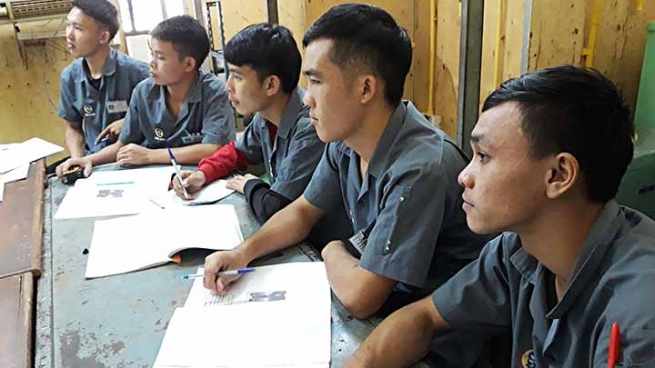LAOS: Poor and marginalized students receive vocational skills training at Don Bosco Youth Vocation Training Center

(MissionNewswire) The Don Bosco Youth Vocation Training Center in Vientiane, Laos’ capital city, offers skills training to poor and marginalized youth, providing them with the skills necessary for employment. The center currently serves 143 students including 62 boarders who live within its small Salesian community.
Kasanya is a young, energetic and determined 23 year old student at the Don Bosco Center. His father is a retired medical doctor who completed his studies in Vietnam and his mother is a farmer. He, his eight siblings and his parents are from a small village in the Northern province of Laos, close to the Vietnam border and about 700 km from Vientiane.
Due to a family situation, Kasanya lived in a small rented house close to the school he attended since he was 12 years old. He attended high school but did not finish or receive a diploma. His elder brother studied at the Don Bosco Youth Vocation Training Center in 2010 and introduced Kasanya to its programs. Since then, Kasanya has chosen to take courses in the auto mechanic department since he already had a job working in a mechanic shop.
“I’m happy and satisfied and love to be at Don Bosco because the whole group of trainees makes a family environment. This atmosphere is conducive for our growth and helps to get some skills needed in my future life,” explains Kasanya. “After graduation, I will try to find work to earn money and start my own life. I would prefer to start in Pakse, a city in southern Laos, since there is more work than in the north and also the weather is not very cold.”
Kasanya adds, “In my homeplace in northern Laos, there are very few cars and not many job opportunities. My dream is to live a simple life with my future wife and three children. I would like to succeed to earn enough for the life of my future family. I have no expectation to become rich. I would like to live just as an ordinary citizen and help give a good education to my children.”
Salesian missionaries first began working in Laos in 2004 when an Italian Salesian missionary, Father Tito Pedron, a teacher and five past pupils of a Salesian vocational training school in Thailand began what they called, the Laos Project. The project began with 12 students and by the second year, enrollment had doubled. When inspectors sent by the Ministry of Labor visited, they were impressed by the professionalism of the teachers and the level of student learning.
Poverty in Laos, formally known as the Lao People’s Democratic Republic, has been on the decline for the last decade, according to the World Bank. Despite improvements in the economy, the poverty rate in Laos is at 23.2 percent. Poverty in Laos tends to be higher in underdeveloped, mountainous areas of the country. Those that live in these isolated areas are often left without access to electricity, schools and even roads.
Many of the ethnic minorities in Laos live in underserved, rural areas. These minority groups are further isolated by barriers in language, customs and religion. This, combined with geographic isolation, contributes to a higher rate of poverty for those who live in rural communities.
The economy in Laos has been rapidly growing. Not only is the country the fastest-growing economy in the East Asia and Pacific region but also in the world. The growth can be attributed to the fact that Laos is home to a bounty of natural resources that include water, minerals and forests. Additionally, construction and services have expanded and contributed to an increase in tourism and foreign investment.
###
Sources:
ANS Photo (usage permissions and guidelines must be requested from ANS)
ANS – Laos – Laotian life dreams are becoming reality in Don Bosco
World Bank – Laos




